International meeting
of providers of formation AND ANIMATORS OF VOCATIONS
Rome, 12-17 October 2017
Message of the Superior General
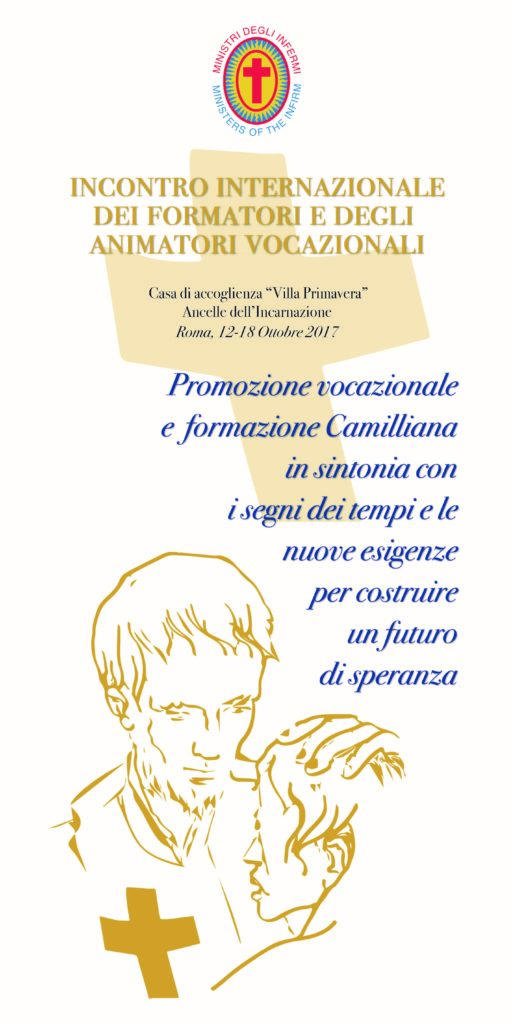 ‘The processes of internationalization should involve all the Institutes (both for men and for women) in becoming laboratories of supportive solidarity where different sensitivities and cultures can acquire strength and meanings that are not known elsewhere and are thus highly prophetic. This supportive hospitality is constructed with true dialogue between cultures so that everyone can convert to the Gospel without abandoning their own’
‘The processes of internationalization should involve all the Institutes (both for men and for women) in becoming laboratories of supportive solidarity where different sensitivities and cultures can acquire strength and meanings that are not known elsewhere and are thus highly prophetic. This supportive hospitality is constructed with true dialogue between cultures so that everyone can convert to the Gospel without abandoning their own’
(Congregation for Religious, New Wineskins for New Wine, 2017, n. 40)
Dearest Camillian religious involved in the promotion of vocation and in formation for Camillian consecrated life: to you special good wishes for health and peace in the Lord of our lives and our vocation!
It is with great joy that I give you a warm welcome to our international meeting of Camillian providers of formation and animators of vocations which was conceived, planned and programmed by the General Consulta of the Order.
We are responding to a call of the last extraordinary General Chapter (Rome, Ariccia, June 2014) which pointed to formation as one of the three priorities of the Order, together with the economic question and communications, for the six-year period 2014-2020, starting with the Camillian Project for a Creative Life: Challenges and Opportunities.
In this Message I do not want to speak about the symptoms of the crisis of consecrated life today in the Church (the fall in vocations, the ageing of religious, the future of vocations in Europe…) of which we are all well aware. During the Year of Consecrated Life (2015) we discussed and spoke in an exhaustive way about these questions and issues and it is good not to forget about them. To diagnose the crisis is much easier and simpler than proclaiming and cultivating a way out, of hope, in this reality of ours. Today there is no lack of ‘prophets of woe’, whereas I believe we are orphans of ‘prophets of hope’. With our feet on the ground (knowing about realities) and with hope in our hearts (joy and the deep belief that we have received from the Lord the gift of a Camillian vocation), we want to construct for the present and the future a new culture for the promotion of vocations and Camillian formation.
The pathway adopted by this Message, which is an introduction to this international meeting, is organised around five points: 1) the subject matter and the objectives of the meeting; 2) a look at our Constitution and General Statutes as they relate to formation; 3) the subject of formation in the Camillian Project; 4) some suggestions from the magisterium of Pope Francis as regards the subject of formation and the animation of vocations; and 5) vocational discernment and interculturality.
- The International Meeting of Camillian Providers of Formation and Animators of Vocations
This international meeting has as its general subject: ‘The Camillian Promotion of Vocations and Formation in Harmony with the Signs of the Times and New Needs to Construct a Future of Hope’.
Principal objective: in communion, we seek an updating and a revitalisation of our visions, activities and instruments in the area of the Camillian promotion of vocations and formation.
Specific objectives:
1) To bring the Guidelines for Formation of the Order (2000) up to date.
2) To diagnose and learn about some of the characteristics of today’s young people in a globalised world.
3) To take interculturality into account in the process of vocational discernment and formation.
4) To facilitate exchange and thought about experiences involving the promotion of vocations and formation (the signs of hope, opportunities and challenges).
5) To foster knowing each other and fraternal being together amongst those taking part in this meeting.
This is a very demanding and complex work agenda for all of us: I hope that it will be able to bear a great deal of fruit for the future of the whole of our Order of Camillians.
I would like to recall some fundamental aspects of our Constitution and General Statutes and of the Camillian Project for a Faithful and Creative Life: Challenges and Opportunities as they apply to formation and the promotion of vocations.
- The Constitution and General Statutes
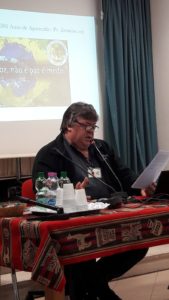 At article 71 of our Constitution we read: ‘We all take part in this duty by means of our personal witness, prayer and evangelization. Moreover, our communities, by their example and effective pastoral ministry, are instruments of our charism within the local Church in which we cooperate in the work of vocation promotion. Each community becomes aware of this important duty and organizes whatever is necessary for a fruitful promotion of vocations’.
At article 71 of our Constitution we read: ‘We all take part in this duty by means of our personal witness, prayer and evangelization. Moreover, our communities, by their example and effective pastoral ministry, are instruments of our charism within the local Church in which we cooperate in the work of vocation promotion. Each community becomes aware of this important duty and organizes whatever is necessary for a fruitful promotion of vocations’.
Article 72 observes: ‘To assure an authentic formation which is human, Christian, spiritual, apostolic and Camillian, documents of the Church, our Guidelines for Formation, the rules of sound psychology and pedagogy, and the conditions of life which are in continual social and cultural evolution, are to be borne in mind’.
As regards ongoing formation, we read at article 87: ‘All our religious, conscious of the need to advance in maturing of their personal lives, and taking into account the changing conditions of the times, endeavour to renew their spiritual and cultural lives and to update their individual professional competence in the exercise of the ministry so as to render their apostolate increasingly effective. The superiors, for their part, provide the necessary time and means to this end’.
In the General Statutes we read at article 45: ‘In each province those who are in formation are educated according to particular ‘formation guidelines’ in which the general laws of the Church as well as the rules of the constitution and general statutes are adapted to the particular circumstances of time and place. These formation guidelines are to be reviewed periodically, bearing in mind the orientations of the Church and the Bishops’ Conferences. They are established by the provincial chapter and approved by the general consulta (C 72)’.
Article 62 contains the following words: ‘Our religious acquire a clear identity and suitable Camillian training by also availing themselves of the Camillianum and centres for pastoral care, for humanisation and for formation…Where possible the civil recognition of such qualifications shall be obtained’.
Article 63 affirms: ‘Where countries are linked through similar language and culture, the creation of joint formation centres should be fostered, provided competent resources for this ministry are available. Seeing cooperation as a fundamental resource, the provinces/vice-provinces/delegations avail themselves of tried and tested institutions of formation that are characterised by the presence of trained providers of formation as well as experts, and where suitable they make their own religious available’.
- The Camillian Project for a Faithful and Creative Life (for the six-year period 2014-2020)
In our Camillian Project for a faithful and creative life: challenges and opportunities (2014-2020) it is said that ‘the future of the Order depends on the quality of the formation for candidates’ and in the operational recommendations about the three levels of formation (the formation of those who provide formation, initial formation and ongoing formation), we read as follows:
The formation of those providing formation: ‘Constitutes an absolute priority in which the Order is called to invest constantly. Their specific training, which should be not only academic (psycho-pedagogic) but also experiential and ministerial (pastoral and spiritual), is the best guarantee for the future itself of the Order. Whereas in the case of the promotion of vocations it is right to involve the youngest religious, for the field of formation religious should be co-opted who have had at least six years (two three-year periods) of community religious life lived in the practical implementation of the charism’.
Initial formation: ‘The important and delicate field of initial formation is perhaps the aspect that highlights in an unequivocal way the need for the unification of efforts and inter-Provincial cooperation and/or exchange with other Institutes, both to achieve a more effective optimisation of resources and to achieve a more complete formation of candidates’.
Ongoing formation: ‘It is necessary to define ongoing formation on the occasion of the fourth centenary, the jubilees for religious, but above all during the first ten years after perpetual profession. The creation of an ad hoc programme drawn up for continents or language areas constitutes a priority. This formation programme should contain imperative references to the link between the charism and spirituality, fraternity and the vow of poverty, and the capacity for witness to a sober life that respects the resources of the creation’.
Some Suggestions from the Magisterium of Pope Francis
4.1. From the Congregation of Institutes of Consecrated Life and Societies of Apostolic Life (CIVCSVA).
In recent years the world of formation has witnessed a profound transformation in terms of methods, language, dynamics, values, purposes and stages. As Pope Francis observed: ‘One must always think in the people of God, inside it…We must not train administrators, managers, but fathers, brothers, travelling companions’; ‘formation is craft work, not police work’.
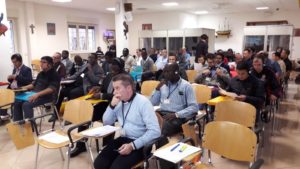 ‘The adoption of their own Ratio Formationis has involved a major part of the Institutes in order to respond to new needs. However, one notes a notable divergence at the level of language, quality, and mystical wisdom. Even though they have been freshly produced, revision is needed of these handbooks which are copied from each other. This is specifically because the question of formation is a fundamental aspect for the future of consecrated life’ (cf. Congregazione per gli istituti di vita consacrata e le società di Vita Apostolica, Per vino Nuovo Otri Nuovi, Libreria Editrice Vaticana 2017, n. 34; Congregation for Institutes of Consecrated Life and Societies of Apostolic Life, New Wineskins for New Wine, n. 34).
‘The adoption of their own Ratio Formationis has involved a major part of the Institutes in order to respond to new needs. However, one notes a notable divergence at the level of language, quality, and mystical wisdom. Even though they have been freshly produced, revision is needed of these handbooks which are copied from each other. This is specifically because the question of formation is a fundamental aspect for the future of consecrated life’ (cf. Congregazione per gli istituti di vita consacrata e le società di Vita Apostolica, Per vino Nuovo Otri Nuovi, Libreria Editrice Vaticana 2017, n. 34; Congregation for Institutes of Consecrated Life and Societies of Apostolic Life, New Wineskins for New Wine, n. 34).
4.2. Pope Francis to those taking part in the congress ‘Arise, go and fear not’ on pastoral care of vocations of the Italian Bishops’ Conference (CEI, 5 January 2017):
Horizon and pathway…
‘Before us there opens up the horizon and the path towards the 2018 Synod Assembly, on the theme “Youth, faith and vocational discernment”. The total and generous “yes” of a life given is similar to a wellspring, long hidden in the depths of the earth, which waits to emerge and flow forth, in a stream of purity and freshness. The youth of today are in need of a spring of fresh water to slake their thirst, so as to continue on their searching journey. “Young people want to live life to the fullest. Encountering Christ, letting themselves be caught up in and guided by His love, enlarges the horizons of existence, gives it a firm hope which will not disappoint” (Encyclical letter Lumen fidei, n. 53)’.
Our commitment to service
‘Your service, with its style of proclamation and vocational accompaniment, is also located on this horizon. Such commitment requires passion and a sense of gratuitousness. The passion of personal involvement, in knowing how to care for the lives that are presented to you as troves containing a precious treasure to be preserved. And the gratuitousness of a service and ministry in the Church that requires great respect for those whom you accompany on their journey. It is the commitment to searching for their happiness, and this goes well beyond your preferences or expectations. I make my own the words of Pope Benedict XVI: “Be sowers of trust and hope. The sense of being lost that the youth of today often experience is indeed profound. Human words are frequently without a future or prospects, and also lack meaning and wisdom…Yet, this could be God’s hour” (Address of His Holiness Benedict XVI to participants in the European Congress on the Pastoral Care of Vocations, 4 July 2009)’.
To be credible….Knowing how to waste time in welcoming
‘To be credible and to be in tune with the young, it is necessary to favour the path of listening, of knowing how to “waste time” in hearing their questions and their desires. Your witness will be far more persuasive if, with joy and truth, you will be able to narrate the beauty, stupor and wonder of being in love with God, men and women who live with gratitude their decision in life to help others and to leave an unprecedented and original mark on history. This requires us not only not to be disoriented by external pressures, but also to trust in the mercy and tenderness of the Lord, reviving the fidelity of our choices and the freshness of our “first love” (cf. Ap. 2:5)’.
Creating a new culture of vocations…
There is a need nowadays for a vocational pastoral care with broad horizons and the breath of communion; capable of interpreting with courage reality as it is with its hardships and resistance, recognising the signs of the generosity and beauty of the human heart. There is the urgency of restoring to Christian communities a new “vocational culture”. “The ability to dream and think big is also part of this vocational culture, that wonder that allows the appreciation of beauty and the choosing of it for its intrinsic worth, so that it might make life beautiful and true” (Pontifical Work for Ecclesiastical Vocations, New Vocations for a new Europe, 8 December 1997, 13b).
“I am a mission” …. “Fear not, for I am with you! (Is 41:10)
‘…never tire of repeating to yourselves, “I am a mission”, and not simply “I have a mission”. “We have to regard ourselves as sealed, even branded, by this mission of bringing light, blessing, enlivening, raising up, healing and freeing (Apostolic Exhortation Evangelii Gaudium, 273). Being in permanent mission requires courage, audacity, imagination and the desire to go beyond. Indeed, “Arise, go, fear not” is the theme of your Congress. This helps you to remember many stories of vocations, in which the Lord invites those who are called to come out of themselves to be a gift for others; to these He entrusts a mission and reassures them: “Fear not, for I am with you” (Isaiah 41, 10)’.
- Vocational Discernment and Formation in an Intercultural World. The Experience and Vision of Camillian Providers of Formation
Let us listen to Pope Francis when he speaks about the need for discernment: ‘I am convinced that as a Church community we must increase the habitus of discernment. And this is a challenge, and requires the grace of discernment, to try to learn to have the habit of discernment. This grace, from children to adults, everyone….Amidst a multitude of voices where apparently all of them are  right, discernment of what leads us to the Resurrection, to Life, and not to a culture of death, is crucial. For this reason I emphasise this need so much’ (Pope Francis, at the meeting with priests and consecrated people during his pastoral visit to Milan, the Duomo, 25 March 2017).
right, discernment of what leads us to the Resurrection, to Life, and not to a culture of death, is crucial. For this reason I emphasise this need so much’ (Pope Francis, at the meeting with priests and consecrated people during his pastoral visit to Milan, the Duomo, 25 March 2017).
The Universal Church has chosen to celebrate the Synod of Bishops in October 2018 and its subject will be ‘Young People, Faith and Vocational Discernment’. Looking forward to this synod, in May 2017 the Superior Generals at their general assembly addressed the subject ‘Vocational Discernment in an Intercultural World’.
You are those who are most involved in the animation of vocations and formation. You are the first to assess whether a young man has a vocation or otherwise. For this reason, it would be in our interest to know which criteria you use when interculturality is at stake! I mean by interculturality a plurality of cultures (or multiculturality); the encounter of various cultures; the diversity of people, of their cultures and lifestyles…So: how do you construct unity in diversity?
In the questionnaire that was sent to some Camillian providers of formation, we sought to pay attention to the process of discernment that is utilised in the face of the reality of interculturality in the various Camillian contexts in which we live. 1) What challenges and difficulties do you encounter? 2) What kind of prejudices can be identified in the process of interculturality? 3) Which questions are still open? 4) What pathway of maturation exists with the system of formation? 5) What could be the role of the general government of the Order in the process of interculturality?
An observation may be made about a curiosity in our Order of Camillians. The subject of inculturation was chosen for study at the annual meeting of the major Superiors in the year 1981 – in the light of the apostolic exhortation Evangelii Nuntiandi of Pope Paul VI (1975) – to respond to the problem of evangelisation in the missionary areas of the Order in the world of health and health care in Latin America, Africa and Asia. The Superior General of that time, Fr. Calisto Vendrame (1977-1989), observed: ‘Today more than ever before the Church is aware of the role of culture in the religious lives of men, both of those who evangelise and of those who are evangelised, and of the need to evangelise cultures themselves not in decorative way but going to the roots, if one wants to avoid misunderstandings and dramas’. And he recalled a statement of Pope Paul VI to be found in Evangelii Nuntiandi: ‘The split between the Gospel and culture is without a doubt the drama of our time, just as it was of other times’ (EN n. 20) (cf. C. Vendrame, Inculturazione in: Camilliani/Camillians, n. 141, year XI, November 1981, pp. 541-552).
Fr. Matthew Vattamattam, CMF, the current Superior General of the Claretians, has observed: ‘An inevitable process of death and rebirth is needed when we are called to leave our family milieu and enter a new land with a specific mission. When this process is adopted and accompanied, intercultural encounters and communities are transformed into a fertile and joyous itinerary in the mystery of the abundant love of God for humanity. When a person lives in a new culture for a long time, he passes by way of an initial ‘cultural shock’ that incorporates the agony and the ecstasy of dying to the old and being reborn to the new (M. Vattamattam, Intercultural Community Living: Graces and Challenges, in: www.claretianformation.com., 2 July 2012).
This new outlook on inculturation, which has begun to be appreciated in the field of ministry of the world of health and health care, curiously is still not in the programme of pastoral care for vocation and formation of the Order. Indeed, the Rule of Formation, which was approved at the General Chapter of 2001 and which we will seek to bring up to date during this international meeting, did not yet address the question of, and the need for, discernment and inculturation in the face of the diversity of cultures and interculturality. In the preface we read that ‘these general approaches will go to the Provinces and the Delegations which will have to draw up their own Statutes for Formation in line with local needs. This is delicate work at the level of implementation, not only taking into consideration the cultural peculiarities of different countries but also translating general principles into specific pedagogic stages and strategies’ (Ordine dei Ministri degli Infirmi – Camillians, Regolamento di Formazione: Orientamenti Generali, Casa Generalizia, Roma, 2000; Order of the Ministers of the Sick, Camillians, Guidelines for Formation: General Approaches, Generalate House, Rome, 2000). In this work there is only the concern and the recommendation to ‘translate general principles taking into consideration the cultural peculiarities of different countries’.
This subject and those cited above will be at the centre of the discussions that we will have over the next few days with the aim of bringing the Guidelines for Formation up to date.
I address special thanks to our Vicar General, Fr. Laurent Zoungrana, the member of the General Consulta who is responsible for the animation and promotion of vocations, as well as the organisation of this event. He offered his contribution to the drawing up of the Guidelines which were published in the year 2000. Almost two decades have gone by and many new things have taken place and have changed the world, the Church and consecrated life itself. In the Church we have witnessed the events of three Supreme Pontiffs: St. John Paul II; the foreseeable election and unforeseen abdication of Pope Benedict XVI; and the surprising election of the first Pope from Latin America, Pope Francis. Inside the community of the Church we celebrated the Year of Consecrated Life (2015), the Extraordinary Jubilee of Mercy (2015-2016), the two synods on the family, and in 2018 there will be the synod on ‘Young People, Faith and Vocational Discernment’. Without doubt, there have been and there will be strong moments of evangelisation and καιρός in the world: they have brought many innovative perspectives which we are now called upon to integrate into the work of the bringing up to date of our Guidelines for Formation, which will be our GOS for the Camillian promotion of vocations and formation.
May the Lord, ‘the Lord of Masses’, through the intercession of our Saint Father Camillus and Our Lady of Heath sustain us and help us always to be witness to hope for new vocations in our Order!
Rome, September 2017
Fr. Leocir Pessini
Superior General



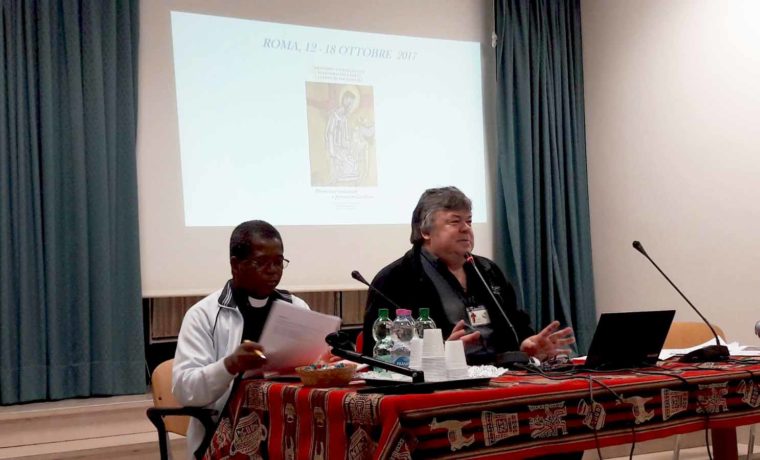
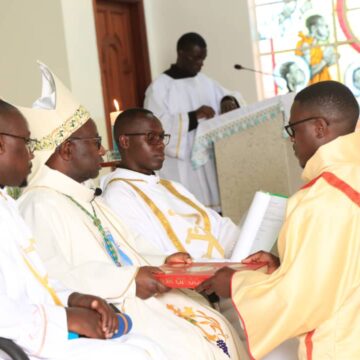

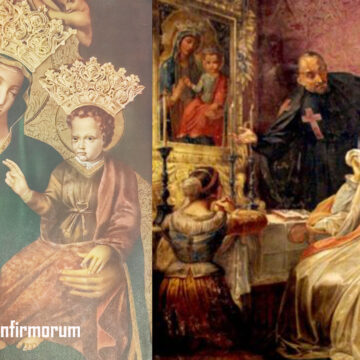
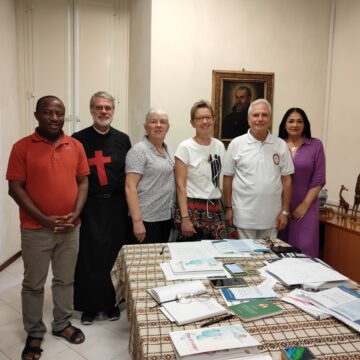

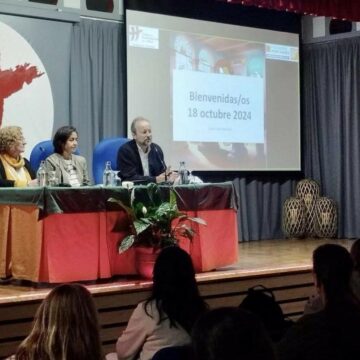
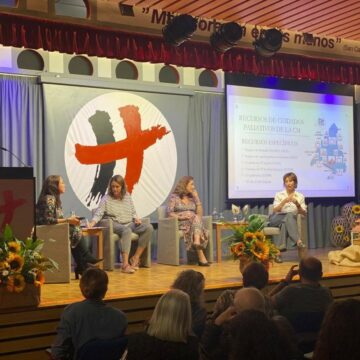
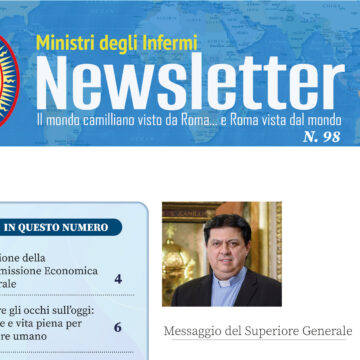
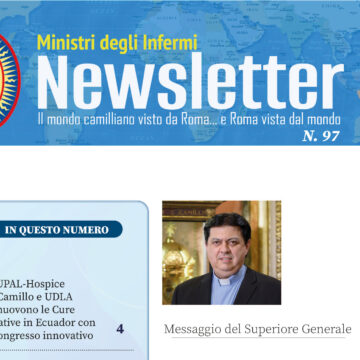
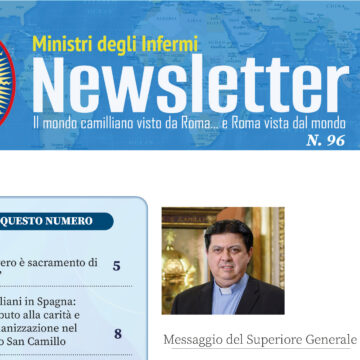
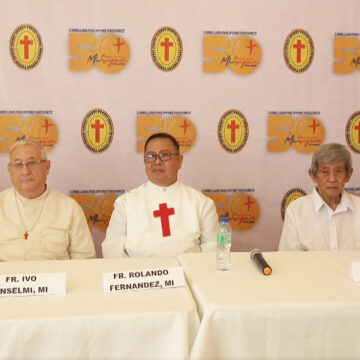
Camillians on Facebook
Camillians on Twitter
Camillians on Instagram